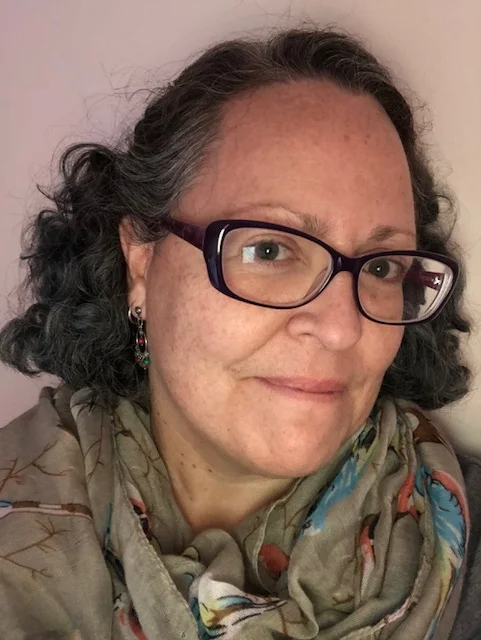Some day I will visit Hawk Mountain
I will be a real birder and know raptors
by the shape of their wings, the span of them
against wide skies, the browns and greys
of their feathers, the reds and whites like specks
of paint. I will look directly into the sun, point and say,
those are Black Vultures, those are Red-Shouldered
Hawks. They fly with the thermals, updrafts, barely
moving, glide their bodies along the currents, borrowing
speed from the wind. I will know other raptors,
Sharp-Shinned Hawk, the Cooper’s Hawk, the ones
that flap their wings and move their bodies during the day.
The Merlins, the Peregrine Falcons, soaring like bullets
through blue steel, cutting the winds looking for rabbits,
ground hogs that will not live past talons and claws.
I will know the size of their bones, the weight
of their beaks. I will remember the curves, the colors
of their oval, coal eyes. I will have the measurements,
the data that lives inside their bodies like a secret
taunting me to find its guts. Or, this is what I tell myself.
But, I am a bad birder. I care little about the exact rate
of a Northern Goshawk’s flight speed. I do not need
to know how many pounds of food an American Kestrel
eats in winter. I have no interest in the feather types
on a Turkey Vulture. I have looked up and forgotten
these facts again and again and again. They float
out of my mind immediately. What I remember:
my breathless body as I look into the wildness above,
raptors flying, diving, swirling, bodies of light, talismans,
incantations, dust of the gods. Creatures of myth,
they hang in the sky like questions. They promise
nothing, indifferent to everything but death.
Still, still, I catch myself gasping, neck craned up,
aching, follow the circles they build out of sky,
reach for their brutal mystery, gravitate to
their promethean promise, the alien spark of more.
To Document
To mark, to list, to catalogue, to register, to chronicle, to cite, to make, to seal, to stamp.
Who is real. Who is allowed. Who is loved. Who is ours.
We think in ceremonies of paper. We document in straight, sharp lines. Imagine charts reveal stars and sky, black holes. As if charts reveal the galaxy. As if the universe hangs on a wall. As if time lives in rigid, measured lists. We cling to ledgers. Sad ink moments. Dead-eye accounting, these rules of the law. Paper means nothing. Where are the cartographies of love?
I Was a Bell
Diagnosis: Dyspareunia, Female
Alternative: Atrophic Vaginitis
My body. I have
forgotten
my body.
Round, soft, too big now. I carry it
a brown faded sack, half-empty
and dry. An after thought of muscle
and fat. It was never much, no luminous
skin or bright blood, always a work-machine.
It was always too much and too little. It
was always hungry and full. It was
a drooping flower, or a bush that needed
too much water and light. Still,
it was mine to run with, mine to use.
Dyspareunia is pain that is associated with sexual activity.
This condition ranges from mild to severe.
Once, when we were young, you carried
me on your back, puddles and water and
cement all mixed in, mixed up in the city
as you galloped five blocks from the Boylston T
to Beacon Street. We were new to love.
You never told me about the mice in the kitchen.
Inside your basement apartment, still wet,
Still laughing. My skin, freckled and slick,
touched your skin, blue veins and life holding
me, my arms, my legs. You loved all the scars,
the extra thick middle parts.
This can affect any part of the genitals or lower abdomen,
and there are many possible causes. Depending on the cause,
dyspareunia may get better with treatment, or it may return
(recur) over time.
For years in the dark, you held me
and my body. You made wholeness out
of broken things, took the cracked parts,
shards and pieces. You were a musician.
I was metal and curves. I was musk
and wood. A bell tower ringing. I was
electricity, the thunder in the ocean.
My singing years. My whole body
marked time in sound.
RISK FACTORS: Certain conditions or situations may lower
a woman's estrogen level, which increases her risk of atrophic vaginitis.
These include: Being treated with X-ray treatment (radiation)
or medicines (chemotherapy).
I never wanted children. Alien cells
and tissues leeching, aching for life
inside. Crab creatures, half starved,
clinging for love. They have seemed
demanding. Wreaking through a life
like fire. Combustible. All knees and
hands and eyes begging for more.
More. More. I never wanted children.
But now. This brown sack of mine
cannot even make them. All gone,
the warmth and water, the blood
of possibility. I am no longer in
the singing part of my body.
CAUSES: The cause of this condition is not always known.
Possible causes include:
Cancer.
M. Soledad Caballero is an Associate Professor of English at Allegheny College. Her poems have appeared in the Missouri Review, the Mississippi Review, the Iron Horse Literary Review, Memorious, the Crab Orchard Review, and elsewhere. She is a Canto Mundo fellow and is working on her first poetry collection. Her scholarly work focuses on British Romanticism, travel writing, Women’s, Gender, and Sexuality Studies, and interdisciplinarity. She splits her time between Meadville and Pittsburgh.
